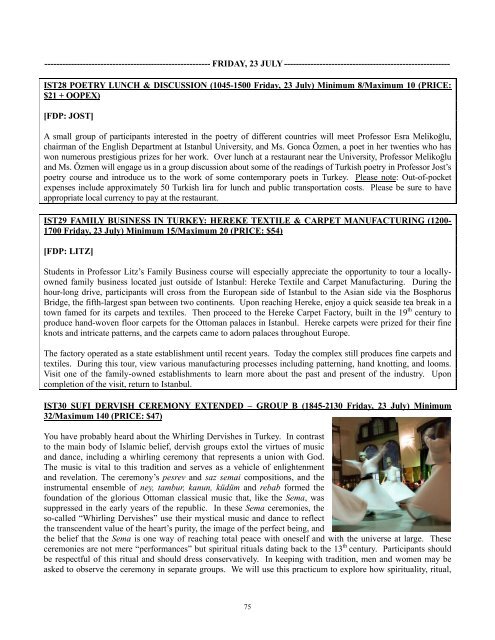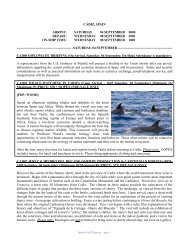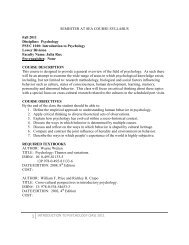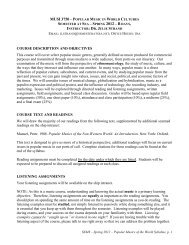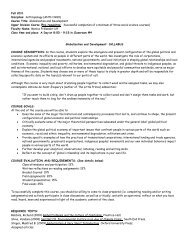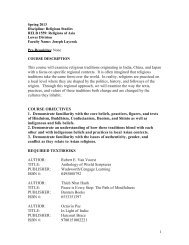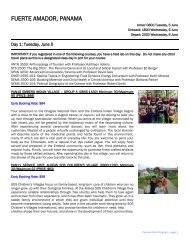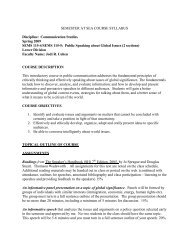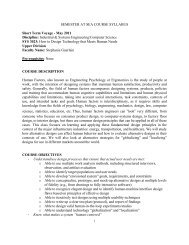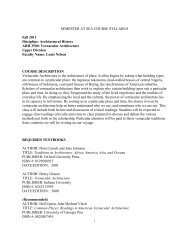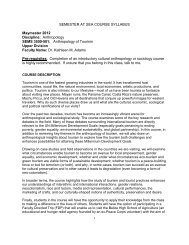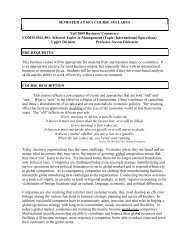istanbul, turkey arrive: tuesday 20 july 0800 depart - University of ...
istanbul, turkey arrive: tuesday 20 july 0800 depart - University of ...
istanbul, turkey arrive: tuesday 20 july 0800 depart - University of ...
You also want an ePaper? Increase the reach of your titles
YUMPU automatically turns print PDFs into web optimized ePapers that Google loves.
-------------------------------------------------------- FRIDAY, 23 JULY --------------------------------------------------------<br />
IST28 POETRY LUNCH & DISCUSSION (1045-1500 Friday, 23 July) Minimum 8/Maximum 10 (PRICE:<br />
$21 + OOPEX)<br />
[FDP: JOST]<br />
A small group <strong>of</strong> participants interested in the poetry <strong>of</strong> different countries will meet Pr<strong>of</strong>essor Esra Melikoğlu,<br />
chairman <strong>of</strong> the English Department at Istanbul <strong>University</strong>, and Ms. Gonca Özmen, a poet in her twenties who has<br />
won numerous prestigious prizes for her work. Over lunch at a restaurant near the <strong>University</strong>, Pr<strong>of</strong>essor Melikoğlu<br />
and Ms. Özmen will engage us in a group discussion about some <strong>of</strong> the readings <strong>of</strong> Turkish poetry in Pr<strong>of</strong>essor Jost’s<br />
poetry course and introduce us to the work <strong>of</strong> some contemporary poets in Turkey. Please note: Out-<strong>of</strong>-pocket<br />
expenses include approximately 50 Turkish lira for lunch and public transportation costs. Please be sure to have<br />
appropriate local currency to pay at the restaurant.<br />
IST29 FAMILY BUSINESS IN TURKEY: HEREKE TEXTILE & CARPET MANUFACTURING (1<strong>20</strong>0-<br />
1700 Friday, 23 July) Minimum 15/Maximum <strong>20</strong> (PRICE: $54)<br />
[FDP: LITZ]<br />
Students in Pr<strong>of</strong>essor Litz’s Family Business course will especially appreciate the opportunity to tour a locallyowned<br />
family business located just outside <strong>of</strong> Istanbul: Hereke Textile and Carpet Manufacturing. During the<br />
hour-long drive, participants will cross from the European side <strong>of</strong> Istanbul to the Asian side via the Bosphorus<br />
Bridge, the fifth-largest span between two continents. Upon reaching Hereke, enjoy a quick seaside tea break in a<br />
town famed for its carpets and textiles. Then proceed to the Hereke Carpet Factory, built in the 19 th century to<br />
produce hand-woven floor carpets for the Ottoman palaces in Istanbul. Hereke carpets were prized for their fine<br />
knots and intricate patterns, and the carpets came to adorn palaces throughout Europe.<br />
The factory operated as a state establishment until recent years. Today the complex still produces fine carpets and<br />
textiles. During this tour, view various manufacturing processes including patterning, hand knotting, and looms.<br />
Visit one <strong>of</strong> the family-owned establishments to learn more about the past and present <strong>of</strong> the industry. Upon<br />
completion <strong>of</strong> the visit, return to Istanbul.<br />
IST30 SUFI DERVISH CEREMONY EXTENDED – GROUP B (1845-2130 Friday, 23 July) Minimum<br />
32/Maximum 140 (PRICE: $47)<br />
You have probably heard about the Whirling Dervishes in Turkey. In contrast<br />
to the main body <strong>of</strong> Islamic belief, dervish groups extol the virtues <strong>of</strong> music<br />
and dance, including a whirling ceremony that represents a union with God.<br />
The music is vital to this tradition and serves as a vehicle <strong>of</strong> enlightenment<br />
and revelation. The ceremony’s pesrev and saz semai compositions, and the<br />
instrumental ensemble <strong>of</strong> ney, tambur, kanun, küdüm and rebab formed the<br />
foundation <strong>of</strong> the glorious Ottoman classical music that, like the Sema, was<br />
suppressed in the early years <strong>of</strong> the republic. In these Sema ceremonies, the<br />
so-called “Whirling Dervishes” use their mystical music and dance to reflect<br />
the transcendent value <strong>of</strong> the heart’s purity, the image <strong>of</strong> the perfect being, and<br />
the belief that the Sema is one way <strong>of</strong> reaching total peace with oneself and with the universe at large. These<br />
ceremonies are not mere “performances” but spiritual rituals dating back to the 13 th century. Participants should<br />
be respectful <strong>of</strong> this ritual and should dress conservatively. In keeping with tradition, men and women may be<br />
asked to observe the ceremony in separate groups. We will use this practicum to explore how spirituality, ritual,<br />
75


